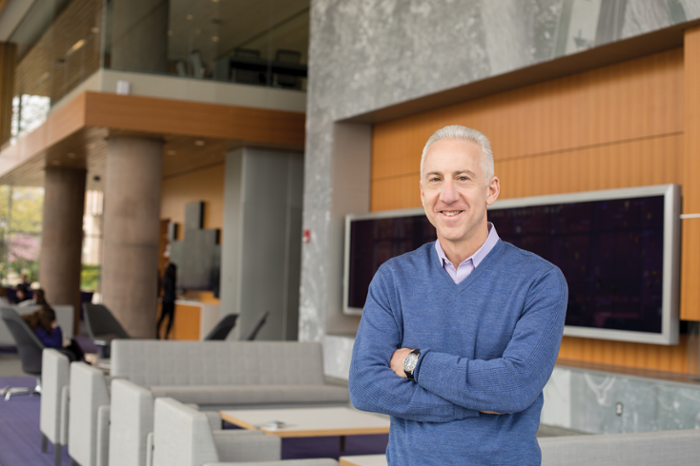Exploring the DNA of Discovery
SHC Program: Deep thinking about how we know
Get all our news

As part of the Science in Human Culture Program, sociologist and IPR associate Steven Epstein focuses on the relationships among social movements, domain experts, and health institutions.
This year marks the 20th anniversary of Northwestern's Science in Human Culture Program, though the program grew out of an even earlier history of science offering, albeit one that emphasized philosophical foundations rather than sociopolitical ones.
The modern program—designed as an adjunct major or minor field for undergraduate students, many of whom are enrolled in pre-med courses—delivers a holistic understanding of science, medicine, technology, and the environment, framing its efforts within the University’s exemplary liberal arts curriculum. The program appeals to those passionate for an educational experience at the intersections of various fields. With the addition of scholars such as sociologist and IPR associate Steven Epstein in 2009 and historian Helen Tilley in 2012, the SHC Program has continued to flourish, deepening its perspective on science as a global phenomenon, rather than one defined only by research in the United States or Europe.
“This is teaching and research for the long haul. It’s work that helps historicize complex problems, whether in medicine, technology, environmental policymaking, or other areas, and demonstrates that every problem has a wider context,” says Tilley, current SHC director and an expert in colonial and post-colonial Africa.
In his study of the “politics of knowledge,” Epstein, Tilley’s immediate predecessor as SHC director, has made such connections at the intersection of social activism and biomedical research. A celebrated scholar, Epstein has focused on the relationships among social movements, domain experts, and health institutions—an important nexus for what he calls the “contested production of knowledge.”
His work is helping shape a new generation of thinkers, including Morse. In award-winning books such as Inclusion: The Politics of Difference in Medical Research (University of Chicago Press, 2007) and Impure Science: AIDS, Activism, and the Politics of Knowledge (University of California Press, 1996), as well as in his current research examining the social discourses around sexual health, Epstein has shown how the agendas of various stakeholders, including the government, medical professionals, and individuals, affect the credibility of knowledge claims.
“What we come to know—knowledge—becomes political,” he has said.
In his study of the history of AIDS activism, for example, he has detailed how protest movements helped reshape medical research and practice: individuals, including those infected with HIV, came to represent not merely a “disease constituency” but an “alternative basis of expertise” that contested the medical experts using the very language of the medical establishment. Epstein believes that an interdisciplinary program like SHC is beneficial for students looking to understand the “genealogy” and “social manifestations” of such discourses within a larger web of relations.
One of the recent initiatives by SHC faculty that helps to unpack those complexities even more is the Global Medical Cultures and Law project, a three-year effort supported by a “Big Ideas” grant from Northwestern’s Buffett Institute for Global Studies. It deliberately combines the expertise of several Northwestern scholars, in addition to Tilley: Carol Heimer, sociology; Rebecca Seligman, anthropology and an IPR fellow; Laura Pedraza-Fariña, law; and Jeannette Colyvas, education and social policy and an IPR associate. They wish to investigate the intersection of law and medicine to show how global legal frameworks influence biomedical advances and codify arenas of “traditional medicine.”
“One of the foundational issues for this group is the interplay between law and medicine across time and space,” says Tilley. “What is the dividing line, in different parts of the world and at different times, between what is considered science and non-science? Sometimes this has been put in terms of a division between magic and medicine. There are all sorts of implications for legal studies and global health and related questions that law schools address.”
Steven Epstein is professor of sociology and John C. Shaffer Professor in the Humanities. He is an IPR associate.
This article has been adapted from the original published by Northwestern Research.
Published: June 15, 2017.